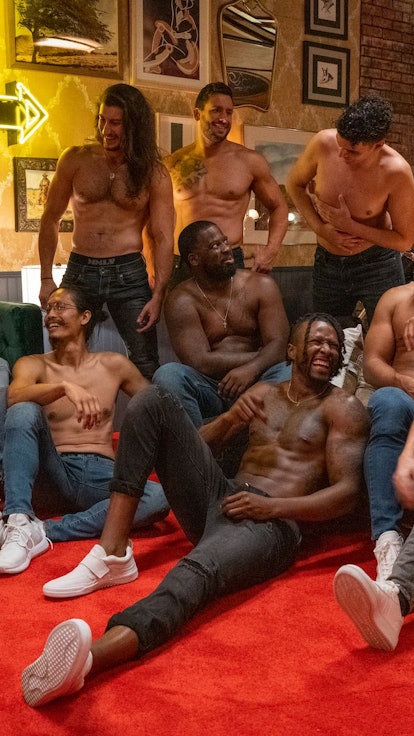In 2012, Magic Mike was a commercial success, bringing in $168 million worldwide on a $6.5 million budget — self-financed by Channing Tatum and director Steven Soderbergh — which is probably only calculated from box office numbers and not any extra bills that made their way into G-strings, but I can’t be sure.
It’s no surprise that the films did so well, with a plot so universal that it touches all who experience it: loosely based on Channing Tatum’s life as a stripper, it follows… yeah, that’s all I remember about the plot, too. Did it have a plot? Visions of someone dealing ecstasy are dancing in my head when I try to recall any sort of story in the first movie, and the second one included a road trip. Maybe?
With a 2015 sequel consisting of double the budget under its belt, as well as a Vegas show, rumors of a Broadway transfer, and a third movie (Magic Mike’s Last Dance) on the way, it was only a matter of time until the franchise tackled one of the only mediums it hadn’t yet conquered: reality television.
Finding Magic Mike, available today on HBO Max, features 10 men (narrowed down from 50) as they go through training and challenges to become a member of Magic Mike Live; the most difficult and most important challenge being to find the magic inside of themselves. The contestant who finds the most magic will go home with $100,000.
At the start of the first episode, Adam Rodriguez, a Magic Mike star who heads up the hosting panel along with Alison Faulk, Luke Broadlick and Vincent Marini (all directly involved with the production of Magic Mike Live), says to the camera, “You probably showed up here to see naked men dancing, and you’re not going to be disappointed.” And suddenly, I don’t feel like such a pig. Well, I mean, maybe I am. But so is most of the intended audience, so I’m in good company.
But I, along with my other swine sisters, quickly discover that we may have come for the swelling, but we’re staying for the sentiment. Was I watching a reality show about male strippers or an episode of This Is Us? I couldn’t be sure, because in the four episodes I had a chance to watch ahead of the show’s premiere, I cried at every one. Sure, the show has all 50 contestants strip down to their underwear and then later do the infamous “dolphin dive” — jumping into a pushup while thrusting — that Channing Tatum made famous in the first movie, but you know what else it has? Heart.
“[The show] is not about stripping,” Michael Thantrong, a behavioral technician and Top 10 finalist from Long Beach, tells the Dipp. “It’s athleticism, beauty, grace, talent, and [we] just happen to take [our] clothes off while [we’re] doing it.”
With contestants ranging from teachers to magicians to lawyers, the show isn’t just the oiled up lap dances I expected it to be, (do not get me wrong; we get our fair share!). Instead, Finding Magic Mike truly is about men who want to find the magic within themselves. “Magic is that thing that sparks you to take a leap of faith,” the guest host of Episode 2 and star of Black Lady Sketch Show, Robin Thede, says. “And that’s exactly what they’re doing here.”
And that is exactly what they’re doing here. Adonis Frank, a nursing student and personal chef from Brooklyn, shares his process of channeling his PTSD of being teased for being dark-skinned and not feeling beautiful or special growing up into confidence. Being surrounded by so many contestants with chiseled bodies and strong athletic backgrounds could have made it so easy to fall back into these insecurities. However, he made sure he was standing for the regular guys; “the guys that have the dad bods, that have the bellies.”
The show allows these men to strip down and get vulnerable and intimate in a way that so many shows, no, that the world, doesn’t: about body dysmorphia, not living up to their family’s expectations, running out of time to “be enough.”
“Men don’t get their credit,” Adonis tells me. “We have our insecurities, we have the mental health days we need to take. I remember going back to my room — some days I would cry, some nights I would have to tell myself, ‘You’re great.’”
Jiovanni Jones, a lawyer from Houston, hopes that audience walks away from this show knowing not to judge a book by its cover. “We’re finding out that magic doesn’t just look physical, magic doesn’t just look emotional or mental. It’s everything. No matter what somebody looks like, the magic really is in everybody, it just takes something or someone to help them find it.”
Images: HBO Max



